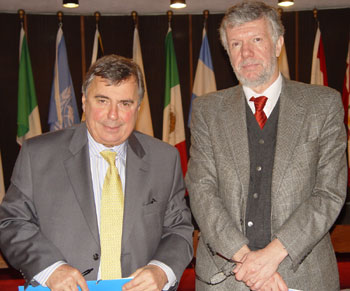Social Exclusion can be Combatted by Universalizing Social Insurance
Topic(s)
The Director of the Paris School of Economics delivered a lecture on social protection in Europe and Latin America and the Caribbean at ECLAC.

(6 May 2010) Universalizing social insurance without linking it exclusively to formal employment is the best way to revert poverty and social exclusion in the region, stated François Bourguignon, Director of the Paris School of Economics during a lecture today at ECLAC headquarters.
Bourguignon, who was Chief Economist and Senior Vice President of the World Bank from 2000 to 2007, spoke on "Recent Trends in Social Protection in Western Europe: Lessons for Latin America?", accompanied by the Ambassador of France in Chile, Maryse Bossière, and the Deputy Executive Secretary of ECLAC, Antonio Prado.
"Throughout more than 60 years, we have been capable of creating a body of thought that is authentically regional, but also alive and critical and that has known how to question and renew itself," said Prado in his welcoming words on behalf of ECLAC Executive Secretary Alicia Bárcena.
"This year we will once again renew this commitment during our Thirty-third Session by offering Latin American and Caribbean governments and societies our reflections through the document 'Time for equality: closing old gaps, blazing new trails'," stated Prado.
In his presentation, Bourguignon made a distinction between two kinds of instruments for social protection: social insurance, such as unemployment insurance or pensions, which depend on individual contributions through time, and social assistance - benefits, subsidies or cash or material transfers not financed through taxes.
In contrast with the European experience, Latin America has a structural deficit in social insurance, which is often financed through general tax revenues. In Peru, for example, the State must subsidize 89% of social insurance; in Argentina, 56% and in Brazil, 40%.
While in Europe public expenditures in social protection as a proportion of GDP is about 25%, in Latin America and the Caribbean it is equivalent to less than 10%, although its structure in terms of the instruments used differ greatly from one country to another in the region. For example, in Uruguay, the country that comes closest to European social spending levels, almost two-thirds of social protection is composed of social insurance, but in Nicaragua, El Salvador and Honduras, social insurance is practically inexistent and social protection is concentrated in instruments of social assistance.
Social insurance in the region is tied solely to formal employment, excluding a large part of the population that lives on precarious or informal jobs, said Bourguignon.
"Social exclusion is rooted in the labour market, and it is not solved by just making social protection more generous, but through policies to improve participation in the labour market, increase employment, or at least decelerate unemployment," he added.
* François Bourguignon's lecture on "Recent Trends in Social Protection in Western Europe: Lessons for Latin America?" is available in audio-visual format on the ECLAC webpage.
For enquiries, please contact ECLAC's Public Information and Web Services Section. Email: dpisantiago@cepal.org; telephone: (56-2) 210-2040/2149.
Related content
Intervención en conferencia magistral de Francois Bourguignon, Director de la Escuela de Economía de París
Por Antonio Prado, Secretario Ejecutivo Adjunto de la CEPAL
Country(ies)
Contact
Public Information Unit
- prensa@cepal.org
- (56 2) 2210 2040